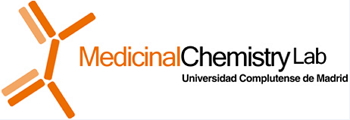DEVELOPMENT OF MEDICAL CHEMISTRY PROGRAMS
|
Description |
The Medicinal Chemistry Laboratory at the Universidad Complutense de Madrid (MedChemLab) develops research projects focused on the search of new therapeutic strategies for the identification of new effective treatments for high-incidence diseases. This objective is addressed through medicinal chemistry and chemical biology.
The different medicinal chemistry projects encompass drug discovery programs, in which we develop new compounds with activity in different therapeutic targets and we study their potential for the treatment of specific pathologies, such as Parkinson's disease (allosteric modulators of dopamine D1 receptor), diabetes (allosteric modulators of glucagon-like peptide-1 receptor, GLP-1), spinal cord injury (lysophosphatidic acid receptor antagonists, especially the LPA1 and LPA2 subtypes), multiresistant bacterial infections (inhibitors of the bacterial protein FtsZ), and tuberculosis (antibody-drug conjugates)

Medicinal Chemistry Lab – UCM
|
How does it work |
The different medicinal chemistry programs are carried out using methodologies developed in the MedChemLab:
Design of new compounds using computational models: pharmacophore, virtual screening, docking, analysis of ADME parameters (clogP, solubility, stability, permeability, bioavailability).
Synthesis of the proposed new compounds: design of the synthetic routes, set up of the reactions, preparation and purification of the desired products.
In vitro screening of the new synthesized compounds: binding assays, cellular cytotoxicity, ELISA-type assays, calcium mobilization, protein expression levels, nuclear magnetic resonance experiments (STD, HSQC, ...), etc.
ADME(T) properties and pharmacokinetic (PK) study of active compounds: solubility, chemical, serum and metabolic stability in liver microsomes (LM), albumin binding (HSA), cellular permeability (PAMPA), plasma and brain levels (B/P), cytochrome inhibition (CYP), cardiotoxicity (hERG).
In vitro pharmacological characterization of selected compounds: functional activity (dose-response curves), selectivity, signaling pathways (calcium mobilization, protein phosphorylation), insulin secretion in pancreatic cells, phenotypic antibacterial study.

Stages of the preclinical phase in a medical chemistry drug discovery program
|
Advantages |
The most innovative aspects of the different research lines developed in the Medicinal Chemistry Laboratory are: (i) compounds with novel structural scaffolds that represent an extension of the pharmacologically active chemical space and, therefore, with potential interest for further development by the pharmaceutical industry; (ii) compounds with different mechanisms of action from that of other drugs available in the market; (iii) drugs of potential usefulness for the treatment of pathologies that lack adequate therapies at present; and (iv) development of new methodologies that can be applied in the pharmaceutical industry, being therefore of potential interest.
|
Where has it been developed |
The present work is developed in the Medicinal Chemistry Laboratory (MedChemLab) located in the Organic Chemistry Department of the Chemistry Faculty at the Universidad Complutense de Madrid. The research team is led by the full professor María Luz López Rodríguez and formed by the associate professors Bellinda Benhamú Salama and Silvia Ortega Gutiérrez, the assistant professors Mar Martín-Fontecha Corrales and Angeles Canales Mayordomo, two postdoctoral researchers, four graduate students, two master students, two undergraduate students, two Erasmus students, and a technician. The group includes researchers with different areas of specialization (organic chemistry, medicinal chemistry, nuclear magnetic resonance, biochemistry, cellular and structural biology, and molecular modeling).
The laboratory has all the equipment and instrumentation of a modern organic chemistry and chemical biology laboratory, necessary to carry out all the experiments of the different medicinal chemistry programs in course. Automatized purification systems, microwave reactor, hydrogenation systems, polarimeter, infrared, ultraviolet and fluorescence spectrometers, and a high pressure liquid chromatography system coupled to mass spectrometry are available. We also have access to the different UCM research support centers (CAI) of nuclear magnetic resonance, proteomics, microanalysis, X-rays, electron microscopy, cytometry, etc.
The solid trajectory of the research group is reflected in the funding of 14 projects financed by public entities and private companies (UCB Pharma, Italfarmaco, Vivia Biotech) in the last 10 years, as well as in its scientific productivity. During the last 5 years, 36 articles have been published in the most prestigious journals in the areas of medicinal chemistry and chemical biology (Nature, Nat. Commun., Nat. Neurosci., J. Natl. Cancer Inst., Angew. Chem. Int. Ed., J. Am. Chem. Soc., Allergy Clin. Immunol., Proc. Natl. Acad. Sci. USA, J. Neurosci., Chem. Commun., Oncotarget, Breast Cancer Res., Int. J. Cancer, Chem. Eur. J., J. Med. Chem., ACS Chem. Biol., J. Biol. Chem.), with an average impact factor of 10.82.
The most relevant contributions of the last 10 years are the study of G protein-coupled receptors (GPCRs), in particular the progression of several 5-HT1A agonists to clinical phase, in collaboration with SchwarzPharma and UCB Pharma (4 patents and 9 articles in J. Med. Chem.); the identification of a new type of cannabinoid receptor located in the mitochondria (5 articles in Science, J. Neurosci., J. Biol. Chem., Nat. Neurosci. and Nature); the validation of FASN and ICMT enzymes as new targets for the treatment of cancer (2 international patents and 7 articles in Clin. Cancer Res., Breast Cancer Res., J. Med. Chem., Int. J. Cancer and Oncotarget); the validation of MAGL enzyme in the treatment of multiple sclerosis (3 articles in Angew. Chem. Int. Ed., J. Med. Chem. and J. Neurosci.); and the development, together with Vivia Biotech, of a potent allosteric modulator of the GLP1 receptor for the treatment of type 2 diabetes (two patents).
|
And also |
Partners are sought from public or private organizations related to the pharmaceutical industry and interested in the development of new drugs.
|
Contact |
|
© Office for the Transfer of Research Results – UCM |
|
PDF Downloads |
|
Classification |
|
Responsible Researchers |
Mª Luz López Rodríguez: mluzlr@quim.ucm.es
Bellinda Benhamú Salama: bellinda.benhamu@quim.ucm.es
Department: Organic Chemistry (Laboratory of Medical Chemistry)
Faculty: Chemical Sciences


